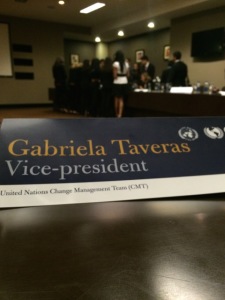In this article, I draw from my experiences as Director of the United Nations Change Management Team (CMT) in UNA-DR’s XV International Conference of the Americas. The purpose of this article is to concretize how skills we learn as delegates can be translated into us being the best committee staff possible.
The time has come and gone since your first Model United Nations conference, and you cannot help but wonder: “Is there more I can do with Model UN other than compete?” Then you move on to discover the wonderful world that is staffing a conference, one of the best ways of changing the lives of other students just like you. Be it your own high school that is hosting it, an organization (IMUNA, UNA-USA, etc.), or a university, you enjoy the prospect of helping others in the same way that you were helped. You know how the flow of debate works, you have developed awesome public speaking skills, and your writing prowess has been kicked up a notch ever since you learned the art of constructing position papers. However, upon listing all that you have accomplished as a delegate (which can help you get into your dream school, that incredible internship and more!), you ask yourself: “How can all this help me be the best possible dais member?” Below you’ll find examples of how some of the top skills you learned as a Model UN hotshot can help you to be the fairest, most knowledgeable dais member possible.
The art of note-taking should never be underestimated. As dais member of a small committee (20 students in total) at CMT, I had to serve as both Director and Rapporteur. In UNA-DR’s Model UN conferences, Directors or Rapporteurs (depending on how big the committee is) are required to submit detailed documents of what happened during the different work sessions. More specifically, the dais prepares a series of Excel spreadsheets detailing the number of speeches a delegation gives, all motions proposed throughout the debate, notes of what each student says during a Moderated Caucus, and a scorecard that grades every possible aspect of a delegate’s performance. To say that note-taking for this purpose was important is an understatement. It is important that, even if the conference has a strict technology policy, you keep a notepad at hand so that you can keep track of what happens during committee. In the end, this will help you decide awards and be accountable for any questions delegates and advisors may have.
Know the topics inside out. This is rather self-explanatory: if you are going to be leading a committee, make sure that you know what you are talking about. In UNA-DR, each committee’s dais is required to write the background guides, which gives them an edge in being prepared for the overall flow of debate. If your organization or school does not follow this system, then be sure to read up on as many official sources as possible and to keep up with the news. It is a common complaint among delegates that Chairs and Directors do not seem well-informed, and being the best possible dais does not stray too far from being the best delegate in the room: you want to convince others with facts and realistic proposals, which requires that you have a good grip on what your students will be discussing.
Understanding of parliamentary procedure is crucial. Once a dais is flagged with too many points of order, delegates begin to lose faith in and respect for those in charge. A Chair who possesses insufficient knowledge of parliamentary procedure will be undermined by his or her delegates which, in turn, will give advisors more than enough reasons to flag the conference with negative feedback. If you are a novice Chair with no staffing experience, keeping a sheet with the rules of procedure does not hurt, but make sure you do not have to resort to using it unless absolutely necessary. Another helpful tip is for you to keep a copy of the actual General Assembly’s Rules of Procedure, which detail how each motion and point must work.
Never forget: we were all delegates once, and we all remember how having a great Chair could make or break our whole committee experience. Preparing ourselves for this arduous task and employing the skills that helped us be successful delegates will help us give back in a way that our students will appreciate for the rest of their Model UN careers.


